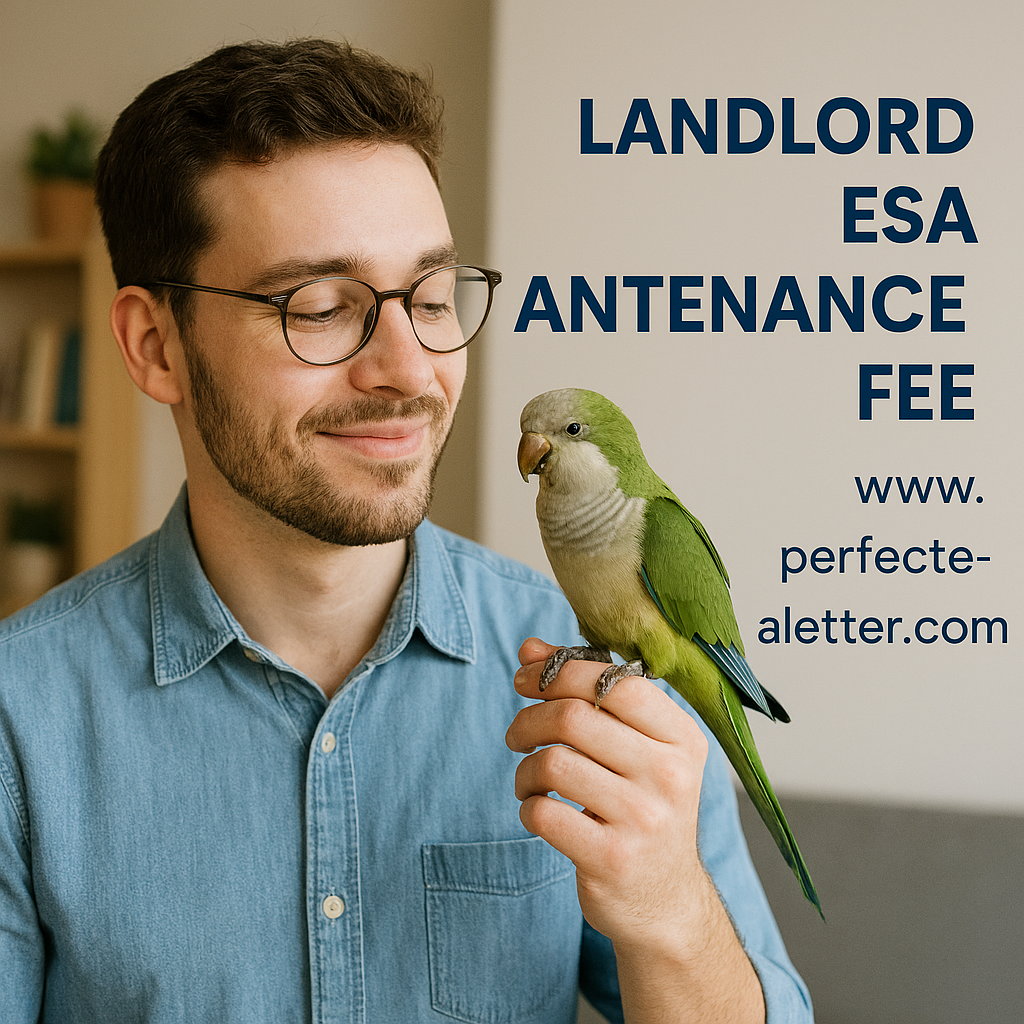Landlord ESA Maintenance Fee: Rights and Regulations for ESA Tenants
Article
Introduction
Emotional Support Animals (ESAs) provide vital support to individuals with mental or emotional disabilities. Federal law, specifically the Fair Housing Act (FHA), guarantees ESA tenants reasonable accommodation even in housing where landlords charge maintenance fees or other charges.
A common issue ESA tenants face is the landlord ESA maintenance fee—a claim that having an ESA justifies extra charges for cleaning, repairs, or general upkeep. Understanding your rights and how to address maintenance fee disputes is essential to protect both your ESA and housing rights.
”Get Yours Now!
Don’t wait until a landlord or airline tells you “no pets allowed.” Protect your rights today.
Please fill out this form and our team wil contact you ASAP.
Complete your assessment in minutes , get approved by a licensed professional, and receive your letter within 24 hours.
Understanding Landlord ESA Maintenance Fee Issues
Maintenance fees may include:
- Cleaning Fees
- Landlords may claim the ESA increases cleaning requirements in the unit.
- Repair or Damage Fees
- Fees for potential damage caused by an ESA, such as scratches, stains, or wear on furniture.
- General HOA or Building Maintenance Fees
- Landlords may argue that common area maintenance costs rise due to ESA presence.
- Pet-Related Surcharges
- Some landlords try to categorize ESAs as pets to justify additional charges.
Important: Federal law protects ESA tenants from these charges. ESAs are not considered pets, and landlords cannot charge fees for their accommodation under the Fair Housing Act.
ESA Tenant Rights Regarding Maintenance Fees
- Right to Reasonable Accommodation
- Landlords cannot impose maintenance fees solely because an ESA resides in the unit.
- Protection from Discrimination
- ESA tenants cannot be penalized financially for having an ESA.
- Exemption from Pet Deposits
- ESA tenants are exempt from deposits, pet rent, or other pet-related charges.
- Right to Documentation
- Landlords may request a valid ESA letter from a licensed mental health professional but cannot charge fees for the ESA itself.
- Legal Recourse
- HUD complaints or legal action can address any attempts by landlords to impose illegal maintenance fees.
Steps to Address Landlord ESA Maintenance Fee Disputes
- Provide Valid ESA Documentation
- Submit a letter from a licensed mental health professional confirming the need for your ESA.
- Review Lease and Fee Policies
- Identify clauses that may conflict with ESA laws, particularly pet-related charges.
- Communicate Clearly with the Landlord
- Explain that federal law protects ESA tenants from maintenance fees and additional charges.
- Document All Communication
- Keep copies of emails, letters, and approvals regarding ESA accommodation and fee disputes.
- Offer Reassurance of ESA Behavior
- Demonstrate that your ESA is well-behaved and unlikely to cause damage, reducing landlord concerns.
- Educate the Landlord
- Share HUD guidelines and Fair Housing Act information emphasizing ESA rights.
- Seek Legal Assistance if Necessary
- A tenant rights attorney can help enforce ESA laws and address illegal maintenance fee claims.
Tips for ESA Tenants
- Know Your ESA Rights – Understanding federal ESA laws is crucial for avoiding illegal charges.
- Submit Verified ESA Letters – Documentation strengthens your position.
- Maintain ESA Behavior – Well-trained ESAs reduce disputes over maintenance or damage concerns.
- Communicate Professionally – Address any concerns with clarity and evidence.
- Document Everything – Keep detailed records of all communications and agreements.
Real-Life Example
Lily, an ESA tenant with anxiety, was charged an additional $150 maintenance fee when moving into a new apartment, citing her ESA.
Lily submitted her valid ESA letter and explained that federal law exempts ESAs from pet-related fees. She also provided references proving her ESA was calm and did not cause damage.
The landlord waived the fee after reviewing the documentation, demonstrating that proper ESA verification, communication, and knowledge of tenant rights can resolve maintenance fee disputes.
FAQs
Q1: Can a landlord charge a maintenance fee for an ESA?
👉 No. ESA tenants are legally protected from fees, deposits, or charges related to their ESA under the Fair Housing Act.
Q2: Can landlords require proof of ESA behavior to waive fees?
👉 Yes, landlords may request ESA documentation but cannot impose fees. Behavior proof can reassure landlords but is not legally required.
Q3: How should tenants address fee disputes?
👉 Provide ESA documentation, communicate your rights under federal law, and document all interactions.
Q4: What if the landlord refuses to remove the maintenance fee?
👉 File a complaint with HUD or consult a tenant rights attorney for legal recourse.
Q5: Can fees be charged for actual damage caused by an ESA?
👉 Yes, if the ESA causes documented property damage, landlords may charge for repairs—but not for accommodation itself.
Conclusion
ESA tenants may face attempts by landlords to impose maintenance fees, but federal law protects them from such charges. ESA accommodation is a legal right, and fees related to ESAs are considered illegal under the Fair Housing Act.
By providing valid documentation, communicating proactively, offering reassurances, and documenting all interactions, tenants can ensure their ESA is legally accommodated while avoiding improper maintenance fees. Understanding ESA rights protects housing stability, promotes positive landlord-tenant relationships, and safeguards emotional support needs.
”Get Yours Now!
Don’t wait until a landlord or airline tells you “no pets allowed.” Protect your rights today.
Please fill out this form and our team wil contact you ASAP.
Complete your assessment in minutes , get approved by a licensed professional, and receive your letter within 24 hours.

